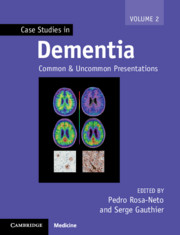Book contents
- Case Studies in Dementia
- Case Studies in Dementia
- Copyright page
- Contents
- Contributors
- Preface
- Case 1 A Young Missionary with Problems Quoting the Bible
- Case 2 Care Planning and Decision-Making through the Stages of Dementia
- Case 3 A Young Man with Memory and Walking Difficulties
- Case 4 Elderly Man Repeating Questions about Upcoming Appointments
- Case 5 A Devoted Wife with an Atypical Finding
- Case 6 A Challenging Thesis
- Case 7 The Forgetful Golfer
- Case 8 The Innapropriate Pedagogue
- Case 9 A 59-Year-Old Man with Weakness and Personality Changes
- Case 10 A Woman with Progressive Episodic Memory Loss and Personality Change
- Case 11 Left-Handed Man with Memory Complaints
- Case 12 Middle-Aged Man Concerned about His Family History
- Case 13 Man Having Trouble Reading
- Case 14 Speechless at First Sight
- Case 15 From Stuttering to Mutism
- Case 16 Middle-Aged Man Looking for Words
- Case 17 The Man Who Stopped Reading
- Case 18 A Meaningless World
- Case 19 Obsessive Mandala Drawing in Semantic Dementia
- Case 20 Forced into Retirement
- Case 21 Who Are These People in My Living Room?
- Case 22 Case of Parkinsonism That Never Had a Good Response to Levodopa
- Case 23 Common Complaints; Rare Pathology
- Case 24 Tremor, Hallucinations, and Cognitive Decline
- Case 25 Dementia Following Stroke
- Case 26 Vascular Cognitive Impairment
- Case 27 Rapidly Progressive Behavioral Changes and Cognitive Symptoms in a 29-Year-Old Woman
- Case 28 Young Woman Feeling Sick and Confused
- Case 29 A Man with Urinary Incontinence and Trouble Walking
- Case 30 Something Very Wrong Happened Very Fast
- Case 31 Siblings with a Fatal Cause of Rapidly Progressive Dementia
- Case 32 Left or Right: Which Way to Go?
- Case 33 Young Woman with Problems Concentrating
- Case 34 Concerns about the Future
- Appendix: Diagnostic Criteria
- Index
- References
Case 3 - A Young Man with Memory and Walking Difficulties
Published online by Cambridge University Press: 09 January 2021
- Case Studies in Dementia
- Case Studies in Dementia
- Copyright page
- Contents
- Contributors
- Preface
- Case 1 A Young Missionary with Problems Quoting the Bible
- Case 2 Care Planning and Decision-Making through the Stages of Dementia
- Case 3 A Young Man with Memory and Walking Difficulties
- Case 4 Elderly Man Repeating Questions about Upcoming Appointments
- Case 5 A Devoted Wife with an Atypical Finding
- Case 6 A Challenging Thesis
- Case 7 The Forgetful Golfer
- Case 8 The Innapropriate Pedagogue
- Case 9 A 59-Year-Old Man with Weakness and Personality Changes
- Case 10 A Woman with Progressive Episodic Memory Loss and Personality Change
- Case 11 Left-Handed Man with Memory Complaints
- Case 12 Middle-Aged Man Concerned about His Family History
- Case 13 Man Having Trouble Reading
- Case 14 Speechless at First Sight
- Case 15 From Stuttering to Mutism
- Case 16 Middle-Aged Man Looking for Words
- Case 17 The Man Who Stopped Reading
- Case 18 A Meaningless World
- Case 19 Obsessive Mandala Drawing in Semantic Dementia
- Case 20 Forced into Retirement
- Case 21 Who Are These People in My Living Room?
- Case 22 Case of Parkinsonism That Never Had a Good Response to Levodopa
- Case 23 Common Complaints; Rare Pathology
- Case 24 Tremor, Hallucinations, and Cognitive Decline
- Case 25 Dementia Following Stroke
- Case 26 Vascular Cognitive Impairment
- Case 27 Rapidly Progressive Behavioral Changes and Cognitive Symptoms in a 29-Year-Old Woman
- Case 28 Young Woman Feeling Sick and Confused
- Case 29 A Man with Urinary Incontinence and Trouble Walking
- Case 30 Something Very Wrong Happened Very Fast
- Case 31 Siblings with a Fatal Cause of Rapidly Progressive Dementia
- Case 32 Left or Right: Which Way to Go?
- Case 33 Young Woman with Problems Concentrating
- Case 34 Concerns about the Future
- Appendix: Diagnostic Criteria
- Index
- References
Summary
A young 41-year-old man with memory problems and walking difficulties.
- Type
- Chapter
- Information
- Case Studies in DementiaCommon and Uncommon Presentations, pp. 10 - 13Publisher: Cambridge University PressPrint publication year: 2021

